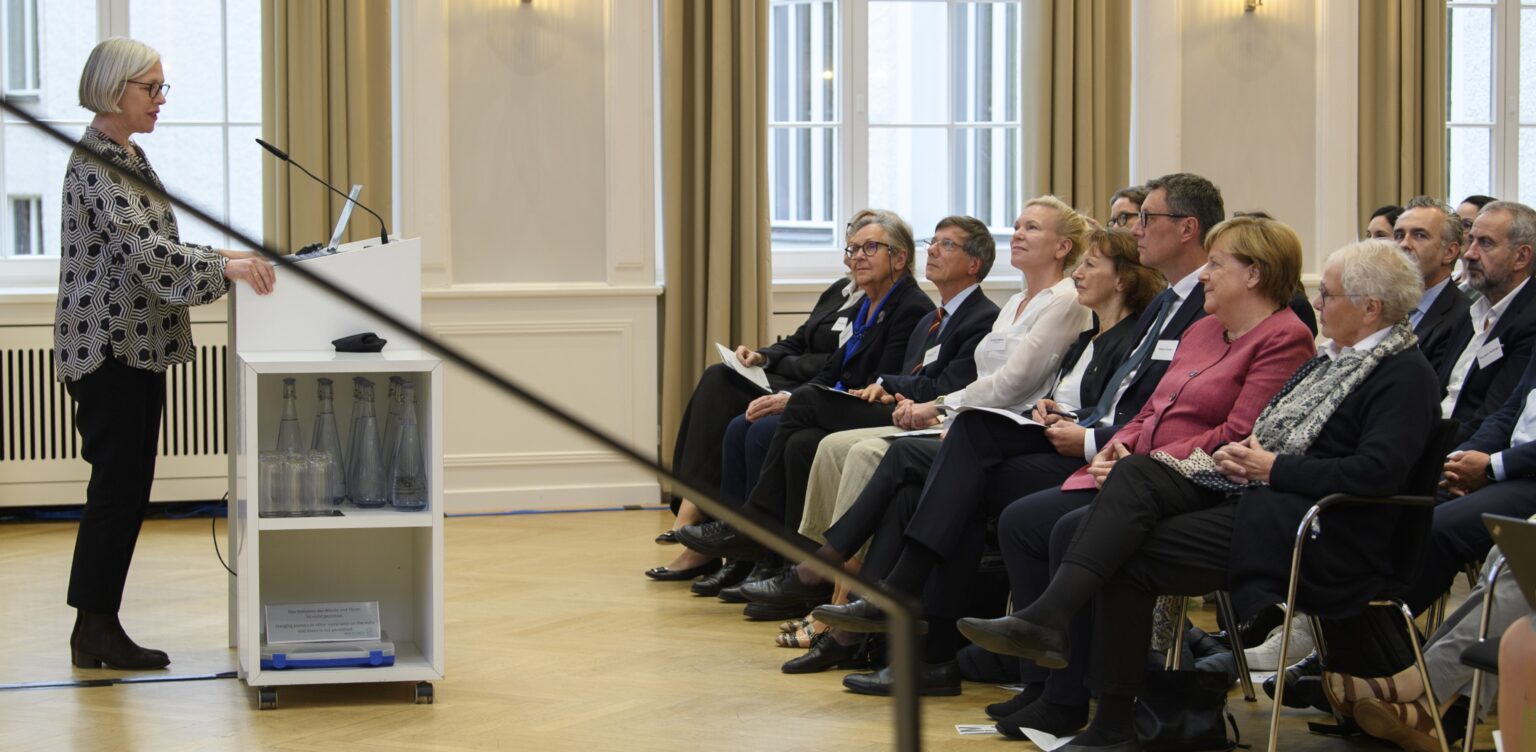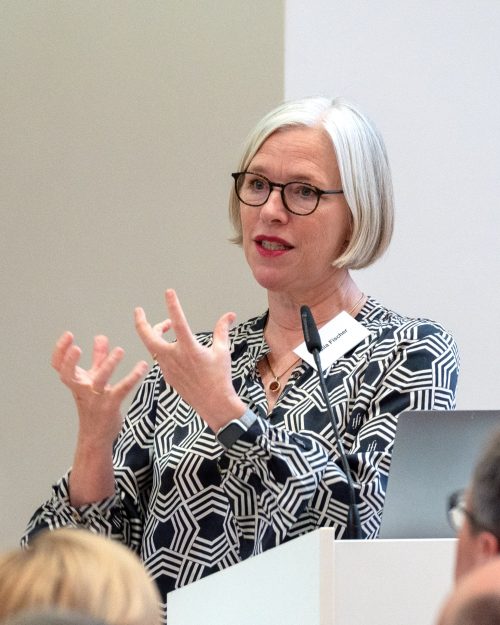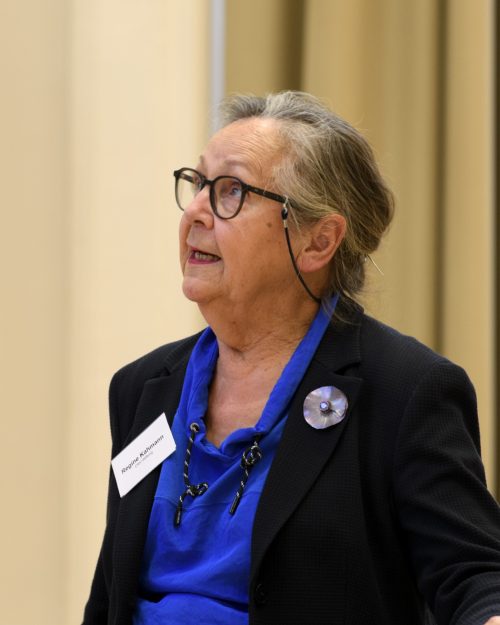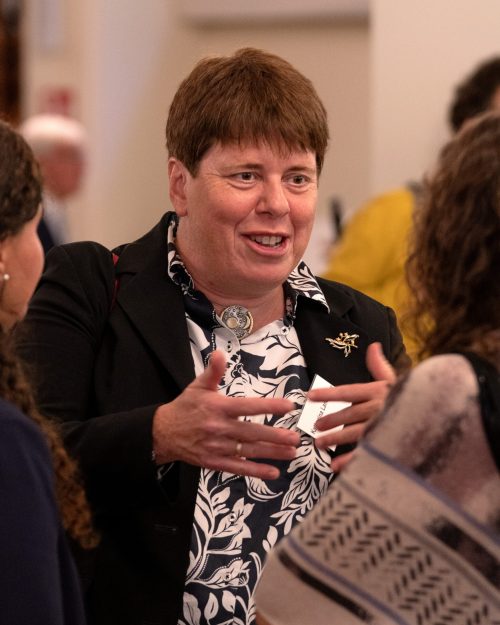
The CNV Foundation’s Board of Directors is supported by an expert advisory board when assessing applicants and selecting scholarship holders.
Prof. Dr. Julia Fischer

Julia Fischer (born 1966) is a professor of primate cognition at the University of Göttingen and head of the Cognitive Ethology Laboratory at the German Primate Center. Her research focuses on the social behaviour, communication and cognition of non-human primates.
After completing her doctorate at the Freie Universität Berlin in 1996, she continued her research at the University of Pennsylvania in Philadelphia; during this time she worked in Botswana for a year and a half, studying wild olive baboons. She then went to the Max-Planck-Institute for Evolutionary Anthropology in Leipzig and habilitated at the University of Leipzig before being offered the position in Göttingen. With her team, she established the Simenti field station in Senegal, where she studies Guinea baboons.
She is a member of the Leopoldina, the Berlin-Brandenburgischen Akademie der Wissenschaften and the Göttingen Akademie der Wissenschaften, as well as a recipient of the Niedersächsischen Verdienstordens. She introduced her work to a wider audience with the book ‘Affengesellschaft’ (Suhrkamp, 2012), which was translated into English in 2017 and Spanish in 2018. In 2013 she received the Werner and Inge Grüter Prize for Science Communication, and in 2023 the Werner Heisenberg Medal from the Alexander von Humboldt Stiftung. Fischer has extensive experience on committees and advisory boards. She has served as a member of the Senate of the German Research Foundation, the University Council of LMU Munich, and as Panel Chair for the European Research Council. She is currently Vice President of the Berlin-Brandenburgischen Akademie der Wissenschaften, Vice Chair of the Board of Trustees of the Schering Foundation, and a member of the Scientific Advisory Board of the Naturkundemuseum Berlin.
Prof. Dr. Reinhard Jahn

Emeritus Director at the MPI for Multidisciplinary Sciences, Göttingen.
He studied biology and chemistry at the universities of Freiburg and Göttingen. Doctorate in biochemistry in Göttingen in 1981. From 1983-1986, postdoc (with Paul Greengard) and then assistant professor at Rockefeller University in New York. Subsequently, group leader for 5 years at the MPI for Psychiatry (now MPI for Biological Intelligence) in Martinsried. From 1991-1997 back to the USA as Professor of Pharmacology and Cell Biology at Yale University School of Medicine/Howard Hughes Medical Institute in New Haven. From 1997 until retirement in 2018 Director of the Department of Neurobiology at the MPI for Biophysical Chemistry, Göttingen, then for just over a year President of the University of Göttingen (2019-2020). Founded/headed the International Max Planck Research School Molecular Biology (2000-2007), then founded and headed the GGNB Graduate School (2007-2014), which was funded by the Excellence Initiative; headed the Max-Planck Präsidentenkommission ‘Junior Scientists’ (2012-2019), as well as a mentor for many years in the Hessian programme ‘Mentoring Hessen’ and in the ‘Dorothea Schlözer Mentoring Programme’ at the University of Göttingen. Member of the Senate of the DFG (2006-2014) and of various scientific advisory boards. Awards include the Max-Planck-Forschungspreis (1990), the DFG Leibniz Prize (2000), the Ernst Jung Prize for Medicine (2004), the Heinrich Wieland Prize (2014), the Balzan Prize (2016).
His research focuses on the molecular mechanisms of signal transduction in nerve cells, in particular the uptake and release of neurotransmitters in presynaptic nerve endings.
Prof. Dr. Regine Kahmann

Emeritus Director at the MPI for Terrestrial Microbiology.
Degree in Biology in Göttingen with a focus on Microbiology and PhD from the FU Berlin in 1974. Between 1974-1980 Postdoc and Junior Group Leader at Cold Spring Harbor Laboratory and then for 2 years Assistant at the MPI for Biochemistry in Martinsried. Between 1982-1987, she headed a junior research group at the Otto Warburg Laboratory at the MPI for Molecular Genetics in Berlin, followed by a research group at IGF Berlin GmbH until 2001. After that, she held professorships in genetics at LMU Munich (1992-2000) and Philipps-Universität Marburg (2002-2019), Director of the Department of Organismic Interactions at the MPI for Terrestrial Microbiology in Marburg (2000-2019).
One focus of her work was initially bacteriophages and how a sequence-specific recombination system molecularly controls the host range of the phage Mu. Since the 1980s, she has devoted herself to the question of how the smut fungus Ustilago maydis colonises plants, causes characteristic disease symptoms (tumours) and manipulates the host plant maize to enable the fungus to reproduce.
Prof. Dr. Katharina Landfester

Director at the MPI for Polymer Research.
Degree in Chemistry at the Technical University of Darmstadt, specialising in polymer chemistry. Doctorate at the Johannes-Gutenberg-Universität in Mainz, with research at the Max-Planck-Institute for Polymer Research. Between 1996 and 1997, postdoc at Lehigh University in Bethlehem, Pennsylvania (USA) and then group leader at the MPI for Colloids and Interfaces in Potsdam-Golm for 5 years. Between 2003 and 2008, C4 professorship in macromolecular chemistry and organic materials at the University of Ulm. Since 2008, Director of the Department of Physical Chemistry of Polymers at the Max-Planck-Institute for Polymer Research in Mainz, professorship at the Johannes-Gutenberg-Universität Mainz. 2013 Foundation of the Elisabeth-Schiemann-Kollegs and since then its spokeswoman. 2024 Awarded the Liebig Medal and the Liesegang Prize.
One focus of her research is mini-emulsion polymerisation: a method that enables the production of complex polymeric nanoparticles and nanocapsules, which redefines the boundaries of polymer chemistry and makes a significant contribution to modern polymer research. The nanocapsules are used both for targeted drug delivery and for the construction of artificial cells.
Prof. Dr. Elsbeth Stern

Professor Emerita for Research on Learning and Instruction at ETH Zürich, Switzerland
She studied psychology at the Universities of Marburg and Hamburg, receiving her diploma in 1982 and her Ph.D. in 1986. From 1987-1994 she was a postdoctoral researcher at the Max Planck Institute for Psychological Research in Munich where she established her long-standing research program on the interaction between intelligence and learning in STEM subjects. The question of what makes certain areas of mathematics and physics so difficult for some learners, and how these difficulties can be alleviated through instruction, became the focus of her scientific studies. In 1994 she became a professor of educational psychology at the University of Leipzig, and in 1997 she was offered a position as a senior group leader at the Max Planck Institute for Human Development in Berlin. She established a research program on the impact of knowledge representations on science learning in elementary school. During her time in Berlin, Elsbeth Stern succeeded in reducing the influence of pseudo-scientific explanations by some neuroscientists about learning difficulties at school.
In 2006, she was offered a professorship at ETH Zurich, where she continued her research on STEM learning in secondary school. From 2012 to 2015, she served as department chair and, until her retirement in January 2025, as head of the teacher education program. She is a member of the Academy of Sciences and Literature Mainz, and in 2018 she received the Franz Emanuel Weinert Prize of the German Society of Psychology for her commitment to the public understanding of science.
https://ifvll.ethz.ch/ueber-uns/personen-forschung/prof-dr-elsbeth-stern.html
